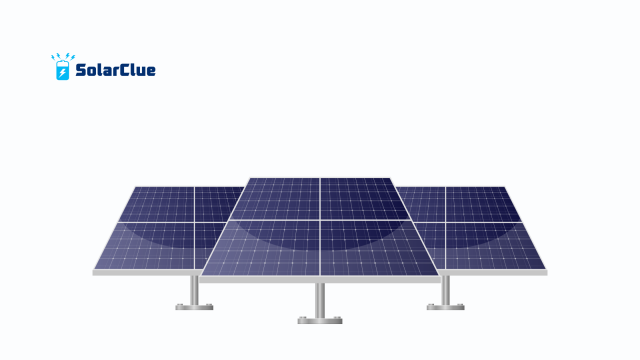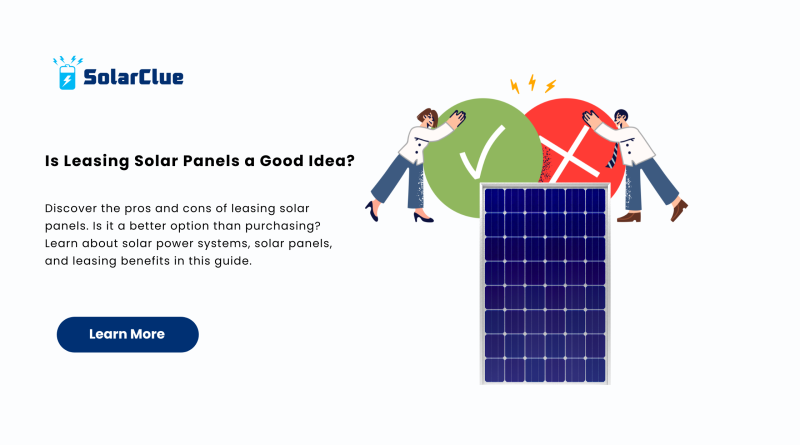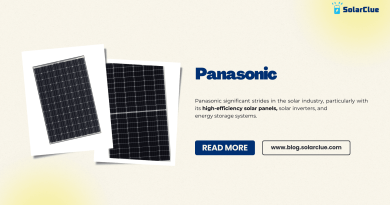Is Leasing Solar Panels a Good Idea?
As the world shifts towards more sustainable energy solutions, solar power has become a top choice for homeowners and businesses. But when it comes to installing a solar power system, many wonder: Is leasing solar panels a good idea? While buying solar panels has long been the go-to option, leasing offers an attractive alternative. This post explores the pros and cons of leasing solar panels, compares it with purchasing, and helps you decide which option works best for your needs.
Table of Contents
What Does Leasing Solar Panels Mean?
Leasing solar panels involves signing an agreement with a solar provider. You pay a fixed monthly fee to use the solar power system. In exchange, the provider installs the panels on your property. You benefit from the electricity generated, but you do not own the system. Leasing is essentially a long-term rental of the solar panels, providing access to solar energy without the upfront cost.
Advantages of Leasing Solar Panels
1. Lower Initial Investment
Leasing solar panels means you don’t need to make a large upfront payment. You can start using solar energy with minimal financial burden. This option is ideal for people who want to reduce electricity costs but can’t afford to buy a solar power system.
2. No Maintenance Costs
When you lease, the solar power provider takes care of maintenance and repairs. If anything goes wrong, you won’t pay for repairs. This can save you money and give you peace of mind, knowing the system is in good hands.
3. Access to New Technology
Solar technology improves over time. With leasing, the provider may upgrade the system as newer, more efficient technology becomes available. This means you get the benefits of cutting-edge solar power technology without worrying about obsolescence.
4. Immediate Energy Savings
Leasing typically allows you to save on electricity bills from day one. While you still pay a monthly fee for the lease, the savings on your energy bills may offset or even exceed the cost of the lease. Over time, this can lead to substantial savings.

Disadvantages of Leasing Solar Panels
1. You Don’t Own the System
The biggest downside of leasing is that you don’t own the solar power system. You pay for the right to use it, but at the end of the lease, the provider owns the system. In contrast, when you buy solar panels, you own them outright, and they can add value to your property.
2. Long-Term Commitment
Leasing typically requires a long-term commitment, often 20 years or more. If you move before the lease ends, you may need to transfer the lease to the new homeowner or pay penalties for breaking the agreement. This can make leasing less flexible than purchasing.
3. Higher Monthly Costs
While leasing reduces upfront costs, it can lead to higher monthly payments compared to owning the system. Over the life of the lease, the total amount you pay may exceed the cost of purchasing a solar power system outright.
4. Limited Control Over the System
When you lease, the solar power provider often controls the system. You may have limited ability to modify or adjust the system as needed. This can be restrictive for those who want complete control over their solar power system.
Is Leasing Solar Panels Better Than Buying?
Whether leasing is a good idea depends on your personal circumstances. If you want a solar power solution without a high upfront cost and don’t mind a long-term commitment, leasing might be the right choice. It’s also a good option for those who don’t want to deal with maintenance or repairs.
However, if you want full ownership of your solar power system, greater flexibility, and long-term financial benefits, purchasing may be better. When you own the system, you enjoy free electricity once the system is paid off, and you have complete control over it.
FAQs
1. Can I buy the solar system after the lease term ends?
Yes, many leasing agreements offer the option to purchase the system at the end of the lease. However, the price may depend on factors such as the system’s age and condition.
2. Are solar panel leasing payments tax-deductible?
No, leasing payments are generally not tax-deductible. However, if you purchase the solar power system, you may be eligible for tax credits and incentives.
3. What happens if I move before my lease term ends?
If you move, you may be able to transfer the lease to the new homeowner. If they don’t want the lease, you could face penalties for breaking the agreement.
4. How long do solar panels last?
Solar panels typically last 25 to 30 years. Most leasing agreements offer maintenance and repairs for the duration of the lease, ensuring the system remains in good working condition.
Conclusion
Leasing solar panels can be a good option for those who want to save on upfront costs and enjoy the benefits of solar power right away. However, it comes with long-term commitments and limited ownership. If you’re interested in exploring the best solar power solutions for your needs, visit SolarClue for a wide range of solar panel options. For more insights, check out our blog at blog.solarclue.com.


